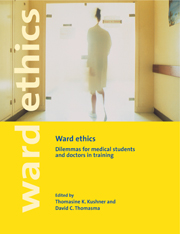Book contents
- Frontmatter
- Contents
- Acknowledgments
- List of contributors
- Prologue. Breaking the silence
- Letter from a young doctor
- Part I On caring for patients
- Section 1 Performing procedures
- 1 The responsibility of informing
- 2 Treating despite discomfort and self-doubt
- 3 Blaming the patient
- 4 Breaking the code: is a promise always a promise?
- 5 The newly dead
- 6 Asking for help: who's listening?
- Section 2 Problems in truth-telling
- Section 3 Setting boundaries
- Part II On becoming a “team player”: searching for esprit de corps and conflicts of socialization
- Section 5 Argot, jargon, and questionable humor: assuming the mantle at the patient's expense
- Section 6 Making waves: questioning authority and the status quo
- Section 7 Perceiving misconduct and whistle-blowing: observing peers or superiors commit an act deemed unethical
- Epilogue: Using this book
- Glossary
- Index
4 - Breaking the code: is a promise always a promise?
Published online by Cambridge University Press: 05 February 2015
- Frontmatter
- Contents
- Acknowledgments
- List of contributors
- Prologue. Breaking the silence
- Letter from a young doctor
- Part I On caring for patients
- Section 1 Performing procedures
- 1 The responsibility of informing
- 2 Treating despite discomfort and self-doubt
- 3 Blaming the patient
- 4 Breaking the code: is a promise always a promise?
- 5 The newly dead
- 6 Asking for help: who's listening?
- Section 2 Problems in truth-telling
- Section 3 Setting boundaries
- Part II On becoming a “team player”: searching for esprit de corps and conflicts of socialization
- Section 5 Argot, jargon, and questionable humor: assuming the mantle at the patient's expense
- Section 6 Making waves: questioning authority and the status quo
- Section 7 Perceiving misconduct and whistle-blowing: observing peers or superiors commit an act deemed unethical
- Epilogue: Using this book
- Glossary
- Index
Summary
CASE
“How ‘confidential’ is confidential?”
The patient was a 13-year-old African–American male who presented to the pediatric clinic with his acting guardian from the boys' home for an entry physical examination. The clinic is staffed by a group of physicians who rotate through on different days of the week, as do the residents and medical students like myself. Providers at the clinic see children from underserved populations and frequently have patients from the local boys' home for physical exams and minor treatment. This young man was like most other children his age, basically healthy and active. He had been sent to the boys' home after driving a stolen car under the influence of alcohol, in addition to a previous history of other legal infractions.
His only health complaint was that he suffered from significant allergies that were causing him congestion and discomfort. He worried this problem might affect his trying out for the freshman football team. As the resident proceeded with the history, I examined the patient and listened. He appeared to be having trouble understanding the resident's accent and clearly did not appreciate how she was phrasing some of the questions, particularly the one implying drug use.
When she left, I remained with the patient, who had denied any drug use. We had a relaxed conversation about the importance of confidentiality in the doctor–patient relationship and how greater accuracy of the history will lead to greater efficacy of treatment.
- Type
- Chapter
- Information
- Ward EthicsDilemmas for Medical Students and Doctors in Training, pp. 50 - 55Publisher: Cambridge University PressPrint publication year: 2001
- 2
- Cited by



